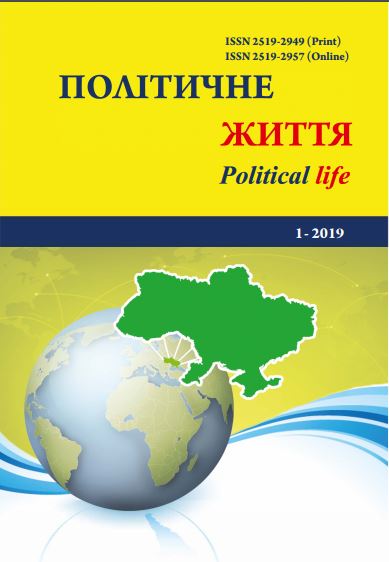The Ratio of Russia's Regional Policy and the US in the Energy Dimension.
DOI:
https://doi.org/10.31558/2519-2949.2019.1.13Keywords:
energy sphere, Caspian region, Caspian Sea, international legal status, Caspian states, regional policyAbstract
The article analyzes the goals and objectives of the diplomacy of Russia and the United States in the Caspian region. The author proves the problem of transit in Russian and American energy diplomacy in the region, examines the interstate relations between Russia and the United States with the countries of the region in the field of energy. The Caspian region has become a new center of gravity of the interests of the countries of the West and the East, and it attracts more and more attention not only as an energy exporting region, but also as an important transit hub. It is the energy factor that has become a prerequisite for political, legal and economic changes in the Caspian region. Given the geostrategic position, political, economic, environmental and other factors, the Caspian region is important for the Russian Federation, at the same time in terms of ensuring national security of military-political and socio-economic nature. The Russian Federation is trying to play a key role in the region, taking into account both the energy and geopolitical factors. In order to secure its own national interests, Russia seeks to preserve its military and political influence in the region and to exclude access of Western forces to the territory of the Caspian Sea. Significant geopolitical interests in the Caspian region are the United States of America. The United States is trying to pursue an energy policy in the region and actively influence the process of exploiting the Caspian Sea's energy resources. To this end, we adopted a new strategy of American energy policy, which was to push Russia out of the Caspian region. In this way, US energy diplomacy has created a new geopolitical situation in relations with Russia. The purpose of the article is to analyze the ratio of regional policy of Russia and the US in the energy dimension. It is stated that the regional strategy of Russia is aimed at the political isolation of the region, which was successfully implemented during the first decades. Its methods are creating zones of controlled instability, delaying the territorial delineation and creating contradictions in the relations of the Caspian states, military domination. The research methods include geostrategic analysis of the position of the countries of the region in the context of the energy goals of the policy of major countries – the United States and the Russian Federation. Used methods of comparative and comparative-historical analysis, which allowed to determine the preconditions for the formation of regional policy of Russia and the United States in the energy dimension. The author concludes that stable socio-economic development and security in the south of the Caspian Sea can only be achieved if the mechanisms of international cooperation are sought, the result of which may be the signing of a multilateral agreement on the international legal status of the Caspian Sea.References
Бжезинский З. Выбор. Мировое господство или глобальное лидерство : монография. Москва : Междунар. отношения, 2004. 288 с.
Голубой поток. URL: http://www.gazprom.ru/about/production/projects/pipelines/active/blue-stream/
Грозин А., Корнеев А., Ершов Ю., Симония Н., Симонов К. «Защита Лугара»: американская администрация бросает очередной «энергетический вызов» России. Нефть России. Москва, 2008. № 5.
С. 18-25.
Губайдуллин А. Газ в Европе: есть ли альтернатива. Россия в глобальной политике. Москва, №1. 2006.
Джиоев А.Т. Тенденции и перспективы добычи и транспортировки энергоресурсов шельфа Каспийского моря. URL: https://cyberleninka.ru/article/v/tendentsii-i-perspektivy-dobychi-i-transportirovki-energoresursov-shelfa-kaspiyskogo-morya
Долгушев Д. В. Конфликт энергетических интересов России и США в Центральной Азии и Каспийском регионе. Вестник Томского государственного университета. Томск, 2011. №4. C. 9097.
Енергетична безпека партнерів США в Євразії залежить від стабільності Каспію – колишній посол США URL: https://ukrainian.voanews.com/a/caspian-becoming-new-center-144935245/918539.html
Жукова И. С. Энергетическая дипломатия и геополитика как составной элемент международного енергетического права. URL: http://vestnik.osu.ru/ 2010_3/11.pdf
Зеркалов Д.В. Политическая безопасность : монография. Киев : Основа, 2012. 1067 с.
Лукьянов С., Перфилов М. Война маршрутов. URL: http://www.nefte.ru/oilworld/kaspiy23.htm
Меджид Ф. США и Азербайджан провели консультации по вопросам безопасности. 25 июня 2011. URL: http://www.kavkaz-uzel.ru/articles/ 187865/
На саммите в Астрахани не решили главную проблему Каспия.
URL: http://www.bbc.co.uk/russian/international/2014/09/140929_caspian_sea_summit
Нафтопровід Баку-Тбілісі-Джейхан відкрито.
URL: https://www.bbc.com/ukrainian/news/story/2006/07/060713_aku_tbilisi_oil_sp.shtml
Назарбаєв Н: Досягнута домовленість про участь Казахстану в проекті «Бургас-Александруполіс». URL: https://www.rbc.ua/ukr/news/n_nazarbaev_dostignuta_dogovorennost_ob_uchastii_kazahstana_v_proekte_ burgas_ aleksandrupolis__1198153148
«Південний потік» перейменують у «Сербський потік».
URL: https://ukr.lb.ua/world/2018/01/29/388471_pivdenniy_potik_pereymenuyut.html
Ричард Морнингстар прибыл в Баку. URL: http://echo.az/article.php?aid=25212
Салыгин В., Сафарян А. Современные международные экономические отношения в Каспийском регионе : монография. Москва : МГИМО (У), 2005. 344 с.
США готують санкції проти компаній-учасниць «Північного потоку-2».
URL: https://www.radiosvoboda.org/a/news/29268295.html
США почали регулярно постачати зріджений газ в Європу. URL: https://biz.nv.ua/ukr/markets/
ssha-pochali-reguljarno-postachati-zridzhenij-gaz-v-jevropu-1298861.html
Текеев А. Политические технологии в энергетической дипломатии.
URL: http://www.observer.materik. ru/observer/N10_2013/024_037.pdf
Терентьев С.А. Нефть : монография. Москва : Книжный Клуб Книговек, 2011. 416 с.
У Єврокомісії відмовилися підтримувати «Північний потік-2».
URL: https://dt.ua/ECONOMICS/u-yevrokomisiyi-vidmovilisya-pidtrimuvati-pivnichniy-potik-2-274449_.html
Уткин А. И. Американская стратегия для XXI века : монография. Москва : Логос, 2000. 216 с.
Черницына С.Ю. Роль энергетической дипломатии в формировании внешней политики России на современном этапе (2000-2014) : дисс. …канд. истор. наук : 07.00.15 / Моск. гос. ин-тут междунар. отношений (ун-тет) МИД Российской Федерации. Москва, 2015. 175 с.
Чумалов М. Каспийская нефть и межнациональные отношения : монография. Москва : ЦИМО, 2000. 560 с.
Южный Кавказ: тенденции и проблемы развития (1992-2008 гг.) / под ред. В.А. Гусейнова. Москва : 2008. 392 c.
Energy and Security: Toward a New Foreign Policy Strategy : monograph. Washington – Baltimore: Woodrow Wilson Center Press, Johns Hopkins University Press, 2005. 604 p.
Letter before 19 the World Petroleum Congress in Spain 2008. World Petroleum Council.
URL: http://www.world-petroleum.org/index.php?/Congresses/19th-wpc.html
Monbiot G. A discreet deal in the pipeline. The Guardian. 2001.
URL: https://www.theguardian.com/business/2001/feb/15/oil.georgemonbiot
TAP project scheduleю URL: http://www.tap-ag.com/the-pipeline/project-timeline
The Global Energy Architecture Performance Index Report 2017. The World Economic Forum. Geneva, 2017. – 32 pp. – URL: http://www3.weforum.org/docs/WEF_Energy_Architecture_Performance_Index_2017.pdf
U.S. Interests in Central Asia: Policy Priorities and Military Roles. RAND. Project Air Force. Prepared
for the United States Air Force. 2005. P. 81.

